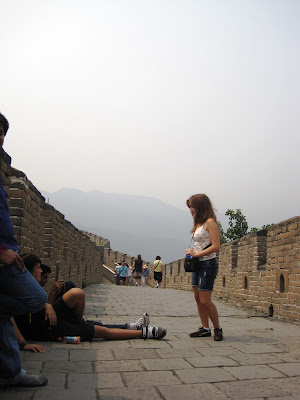Today we said zài jiàn to Shanghai and boarded our flight to Beijing. The flight its self was short--only an hour--but led way to a small crisis. I left my laptop on the plane. I know, I know, that was really stupid, but in my defense, I'm an absent-minded person, and they tell us to stow our possessions underneath the seats during takeoff! Fortunately,
We were able to relax after arriving in Beijing and explore the little street by our hotel, finding a cheap mini-mart with some... questionable items. And a really cute dog.

That evening, we went for a rickshaw ride down the streets of Old Beijing. The rickshaw was pulled by a man on a bicycle and we were able to slip into ancient cobbled lanes, places too narrow for cars to fit. As Max and I rode together in our rickshaw, we noted how different Beijing was from Shanghai. Shanghai was a modern city, built up less than 200 years ago, full of skyscrapers and lights and apartment buildings. Beijing felt much older, ancient, with a history written into its flat-roofed, tiled houses and oriental street corners.




The rickshaw delivered us at an ancient, family-owned home in the Hutong. The family ushered us in and showed us around the house. In traditional Chinese style, the building was built with four sides facing the four cardinal directions (north, south, east, and west), all surrounding a central courtyard. Within the courtyard was a well for pumping water. It was extremely interesting to explore the house, to look into actual bedrooms that had existed for hundreds of years, where people still resided today. The house would have situated an extended family, with all the girls sleeping on one side and the boys on another. I was startled to find out that there was no bathroom in the whole house- family members would have to walk down the street to the public out-house to bathe and use the toilet! For someone used to a bathroom just down the hallway, this was hard to believe.
As we walked around the small courtyard, the men of the house watched us, smoking cigarettes. I wondered what it was like for the family, to have intruders in their personal home walking around and snapping pictures, marveling at something that had been ordinary all their lives. If the family had chosen to, they could have sold the house for a small fortune to some sort of historical commission. However, the family refused to give up their ancestral home and its strong ties with the deceased, instead choosing to live poorly but traditionally.












































